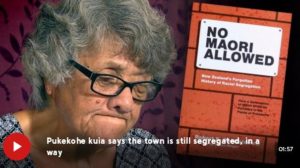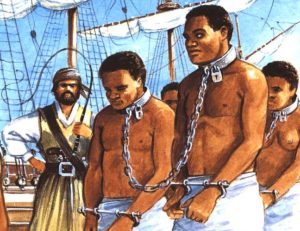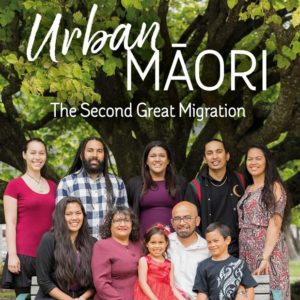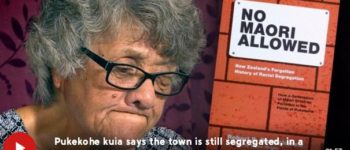1925: “The Segregation Era”
August 24, 2020
By AHNZ
 American sociologist Dr. Robert Bartholomew is looking for an A+ on for his new book in the eyes of Victimhood Culture New Zealand. The secondary school teacher academic dwelling among us claims to have discovered a ‘Segregation Era’ between Maoris and the rest of New Zealand.
American sociologist Dr. Robert Bartholomew is looking for an A+ on for his new book in the eyes of Victimhood Culture New Zealand. The secondary school teacher academic dwelling among us claims to have discovered a ‘Segregation Era’ between Maoris and the rest of New Zealand.
“I am working with journalist James Baker to collect more stories and accounts from people during the segregation era (1925 to the early 1960s). We are looking for people who have any stories of this period and would like to share them with us. This may include the recollection of stories from parents or grandparents….This includes stories from anywhere in Aotearoa.”- nomaoriallowed.com
Was there Segregation In New Zealand?
 Bartholomew’s book, ‘No Maori Allowed’ claims there was a racial Segregation Era in New Zealand from 1925 (oddly specific) to the 1960s. Has the American visitor discovered a new history spanning 40 years that no historian has ever recorded before?
Bartholomew’s book, ‘No Maori Allowed’ claims there was a racial Segregation Era in New Zealand from 1925 (oddly specific) to the 1960s. Has the American visitor discovered a new history spanning 40 years that no historian has ever recorded before?
Bartholomew says he wants people to know the “full story” which apparently is a cut’n paste from the mainstream narrative Americans believe about their own history. He says Maoris were “segregated” and “indentured servants, almost slaves” linking the situation here to pre-Civil War USA.
“The swimming baths at that school…on Friday they let Māori in, then they changed the ‘dirty’ water.”
“Not a single Maori was going to school at that time.”- TVNZ interview
OK, so the school opened its swimming facilities to non-students prior to the water being changed over. Sounds quite charitable of them, yet Bartholomew is spinning this as something sinister??
“barbers in Pukekohe refused to cut Māori hair”
“At the Strand Theatre, they weren’t allowed upstairs,”
“The taxi drivers wouldn’t pick up Māori”
“not a single business in town would allow Māori to use their toilets or public amenities”- ibid
No, of course not.
If you know your history, you know that New Zealand was founded as a country for two people. For a long time, Maoris continued to live a separate existence on their own. By the turn of the century Maoris were almost became extinct. By the 1960s the survivors decided to exit their settlements and join the cities Western New Zealanders had built.
 The time Bartholomew writes about in No Maori Allowed is a time where this Second Migration is starting to happen. Pukekohe was at the front and beginning of this migration at a time when 75% of Maoris still lived rurally in their own settlements.
The time Bartholomew writes about in No Maori Allowed is a time where this Second Migration is starting to happen. Pukekohe was at the front and beginning of this migration at a time when 75% of Maoris still lived rurally in their own settlements.
New Zealand was not conceived as a place with one standard of citizenship, one set of institutions for all. That idea is modern revisionism. Our diversity was not “segregation” but a continuation of cohabitation. If The Treaty of Waitangi signifies anything it is the marker for this (apparently “inconvenient¹”) fact.
“During that period there was one bar in town that would serve Māori alcohol, and at one point, Māori women had to get served outside behind the bar in a field.”- ibid
Put into proper context this is no surprise at all. Would a Colonial New Zealander expect the same rights and privileges in a Maori settlement as a resident there? Could they waltz up and drink from their water supply or hunt or grow food on their land as if they were a full member of the tribe with all the rights and customary privileges? No more than a Maori New Zealander could assume access to a private Colonial bar!
Besides, all women had to be served outside of a bar in certain contexts; They were only for men in some times and places and that didn’t change until the 1970s.
“Not a single person would rent to Māori, forcing them to live on the market gardens in a slum area.”- ibid
“Grandfather moans about the coast of living. Too many meals, too many dishes, too much expense. When he was a child, he had only two meals- one just after sunrise, and one just before sunset. No dishes to wash! This Pakeha habit is running the Maori into debt. What need is there for a bathroom? What is wrong with the river? Why all the need for this scrub, scrub, scrubbing? Grandmother gathers her grandchildren. They all wait for Grandfather to start eating. Then everyone relaxes, and the food disappears.”- The Maori in the City, NZH/New Zealand’s Heritage (1971)
Maoris kept on trying to live the way they always had done until they packed it in and moved to the better towns and cities that the Europeans had created. They migrated out of their old homes, or “slum areas” as the Doctor puts it. Nobody forced them to live those lives- it was the way it had always been. The health, wealth, and economic outcomes nobodies fault but Maoris’ own. The smartest thing they did was to migrate out, just as their ancestors exited the Pacific Islands. They continue to follow this same instinct today- filling up places like Australia’s Gold Coast.
No Maoris Allowed, going by this recorded interview on TVNZ, is utter balderdash. But it is the sort of State History balderdash that the shame-based mainstream will love to eat up. If you don’t go along with it you’re “racist” and Hayley Holt will cry.
—
1 “Introduction: An Inconvenient Truth”; Introduction heading for No Maori Left Behind (2020)
3 thoughts on "1925: “The Segregation Era”"
Leave a Reply
 Like Comment Share
Like Comment Share






Would be interesting to interview people from that era
Thank you, Anarkiwi. It’s Robert Bartholomew’s book which is ‘segregated’ as he produces an unbalanced set of facts and views out of context. He can sit in the Alexander Turnbull library as long as he likes and interview people who give him only those facts and viewpoints which support his thesis, but his output remains unbalanced and frankly, shallow.
The Pukekohe Maori School was established to meet Maori needs in a non-threatening environment. The pupils got two hot showers a week, free medical treatment, transport to school, uniforms and text books. How would that work in a multi-racial school side-by-side with well-to-do Pakeha kids?…. Raif.
I see Bartholomew has received another round of media advertising for his book, as if it were new again, early this month.
Well, you don’t get funding for writing balanced views about race relations do you?